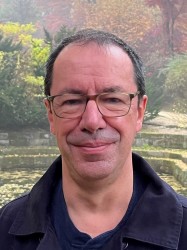Summary
The development of renewable, low cost energy technologies is a key scientific challenge for the 21st century. My group’s primary research interest is the development of new chemical approaches to solar energy conversion – harnessing solar energy either to produce electricity (photovoltaics) or molecular fuels (e.g.: hydrogen). Our studies have recently extended to spectroscopic studies of electrochemical routes to sustainable fuels and chemicals. We undertake fundamental scientific studies of new materials and device concepts, aiming to elucidate design principles which enable technological development. Our research is based around using transient optical spectroscopies to undertake photochemical and spectroelectrochemical studies of electron and energy transfer reactions. Such studies are undertaken in parallel with device development and functional characterisation, including studies of materials and device stability, employing a wide range of molecular, polymeric and inorganic materials. Control of materials structure on the nanometer length scale is often essential for efficient utilisation of solar energy, and therefore the nano-morphology and the use of nanostructured materials is a key component of our research.
My group’s expertise is focused around photochemistry and transient optical spectroscopies. However our research is very much interdisciplinary, with expertise in the group ranging from inorganic materials synthesis and photoelectrochemistry to device physics. We are fortunate to have many collaborations, both with academic groups and with industry, enabling us to work closely with colleagues working on innovative materials synthesis, theoretical modeling and practical device development and commercialisation, including in particular members of Imperial's Centre for Processable Electronics and Swansea's SPECIFIC IKC.
More details of my research and my research team can be found on my group's website.
Alongside leading my research group at Imperial College, I work closely with the SPECIFIC IKC, Swansea University, and lead its ATIP project; this compliments the more fundamental scientific studies of my group, and of my colleagues at Imperial College, through the technological development of printed photovoltaic devices.
I am also Director of Imperial's Centre for Processable Electronics, and was founding director of the UK's Solar Fuels Network.
If you are interested in joining my research group as a postdoctoral researcher, postgraduate student or for an undergraduate internship, please contact Xiaoe Li.
Publications
Journals
Liang C, Katayama Y, Tao Y, et al., 2024, Role of Electrolyte pH on Water Oxidation for Iridium Oxides., J Am Chem Soc, Vol:146, Pages:8928-8938
Moss B, Svane KL, Nieto-Castro D, et al., 2024, Cooperative Effects Drive Water Oxidation Catalysis in Cobalt Electrocatalysts through the Destabilization of Intermediates., J Am Chem Soc, Vol:146, Pages:8915-8927
Hußner M, Pacalaj RA, Olaf Müller-Dieckert G, et al., 2024, Machine Learning for Ultra High Throughput Screening of Organic Solar Cells: Solving the Needle in the Haystack Problem, Advanced Energy Materials, Vol:14, ISSN:1614-6832
Park SY, Labanti C, Pacalaj RA, et al., 2023, The state-of-the-art solution-processed single component organic photodetectors achieved by strong quenching of intermolecular emissive state and high quadrupole moment in non-fullerene acceptors, Advanced Materials, Vol:35, ISSN:0935-9648
Wilson AA, Hart L, Shalvey T, et al., 2023, Transient absorption spectroscopy reveals that slow bimolecular recombination in SrTiO3 underpins its efficient photocatalytic performance., Chem Commun (camb), Vol:59, Pages:13579-13582

